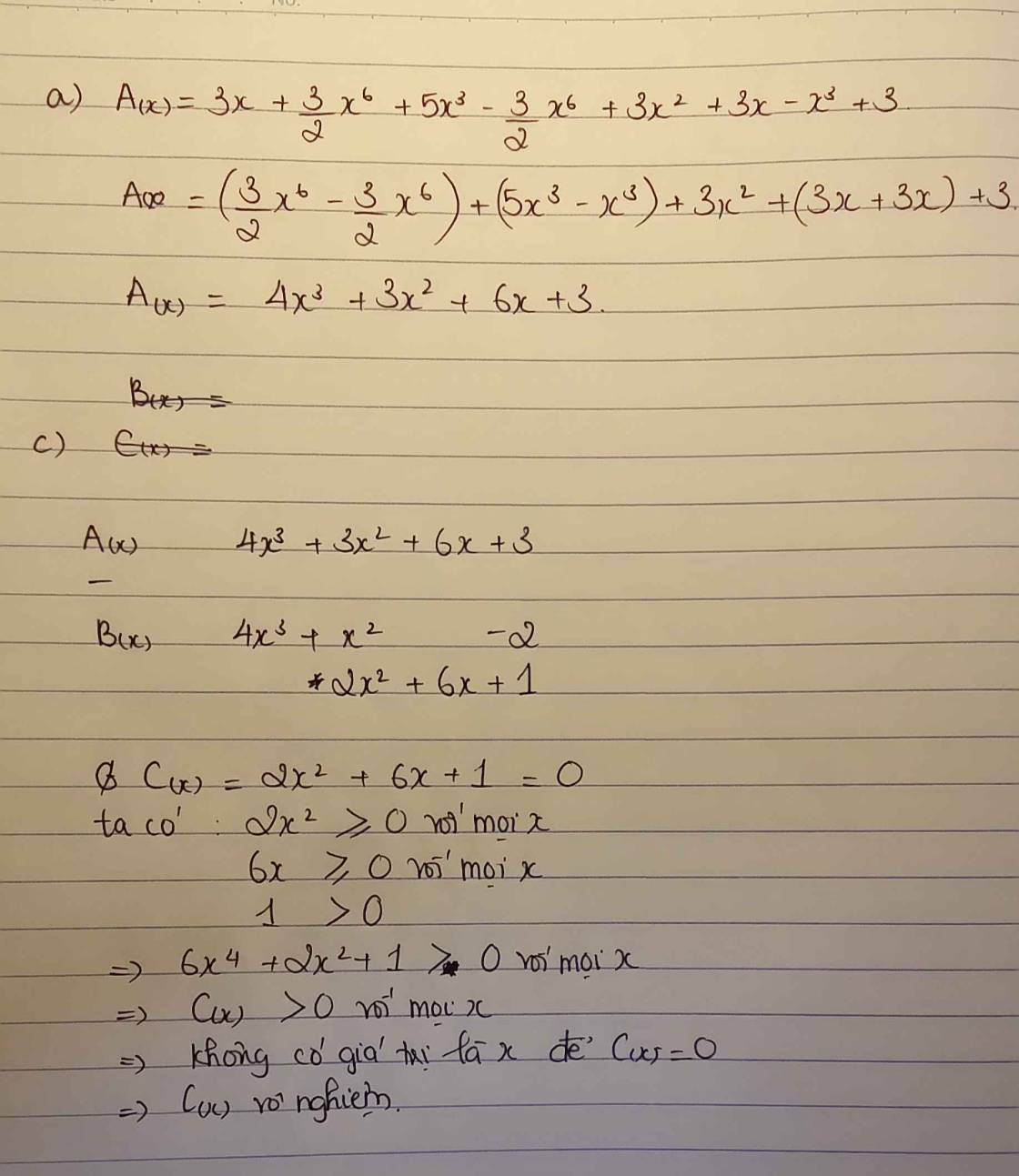Hãy nhập câu hỏi của bạn vào đây, nếu là tài khoản VIP, bạn sẽ được ưu tiên trả lời.

a) \(A\left(x\right)=2x^4-5x^3-x^4-6x^2+5+5x^2-10+x\)
\(=\left(2x^4-x^4\right)-5x^3+\left(5x^2-6x^2\right)+x+\left(5-10\right)\)
\(=3x^4-5x^3-x^2+x-5\)
\(B\left(x\right)=-7-4x+6x^4+6+3x-x^3-3x^4\)
\(=\left(6x^4-3x^4\right)-x^3+\left(3x-4x\right)+\left(6-7\right)\)
\(=x^4-x^3-x-1\)
b) \(A\left(x\right)+B\left(x\right)\)
\(=\left(3x^4-5x^3-x^2+x-5\right)+\left(x^4-x^3-x-1\right)\)
\(=5x^4-6x^3-x^2-6\)
\(A\left(x\right)-B\left(x\right)\)
\(=\left(3x^4-5x^3-x^2+x-5\right)-\left(x^4-x^3-x-1\right)\)
\(=\left(3x^4-5x^3-x^2+x-5\right)-x^4+x^3+x+1\)
\(=2x^4-4x^3-x^2+2x-4\)

\(P\left(x\right)=2x^2+3\)
\(Q\left(x\right)=-x^3+2x^2-x+2\)
\(Px-Qx=x^3+x+1\)
Px - Qx - Rx = 0 => Rx = -(x^3 + x +1)
Q(2) = -2^3 + 2.2^2 - 2 + 2 = 0 => x = 2 là nghiệm của Qx
P(2) = 2.2^2 + 3 = 11 khác 0 => x = 2 không phải là nghiệm của Px
-thaytoan.edu.vn-
a)P(x) = 4x2 + x3 - 2x + 3 - x - x3 + 3x - 2x2
= (4x2 - 2x2) + (x3 - x3) + (-2x - x + 3x) + 3
= 2x2 + 3
=> 2x2 + 3
Q(x) = 3x2 - 3x + 2 - x3 + 2x - x2
= (3x2 - x2) + (-3x + 2x) - x3 + 2
= 2x2 - x - x3 + 2
=> x3 - 2x2 - x + 2
c) Ta có:
P(2) = 2x2 + 3
= 2.22 + 3
= 11 (vô lý)
Q(2) = x3 - 2x2 - x + 2
= 23 - 2.22 - 2 + 2
= 0 (thỏa mãn)
Vậy x = 2 là nghiệm của Q(x) nhưng không phải là nghiệm của P(x)

a) F(x) = 3x2 -2x-x4-2x2-4x4+6
= (-x4 -4x4) + ( 3x2 -2x2) -2x+6
= -5x4 + x2 -2x +6
G(x) = -5x4 + ( -x3 +2x3) +( 2x2 +x2) -3
= -5x4+ x3+ 3x2-3
huhuhu![]()
![]()
![]() làm gần xong r còn câu c đang làm viêt dấu suy ra mà ai dé bấm lộn vô chỗ vẽ hình ...nên nhấn hủy bỏ...âu bt v... là xóa hêt
làm gần xong r còn câu c đang làm viêt dấu suy ra mà ai dé bấm lộn vô chỗ vẽ hình ...nên nhấn hủy bỏ...âu bt v... là xóa hêt![]()
![]() viết trên máy lâu ắm lun
viết trên máy lâu ắm lun

a. Sắp xếp theo lũy thừa giảm dần của biến:
\(P\left(x\right)=5x^5-4x^4-2x^3+4x^2+3x+6\)
\(Q\left(x\right)=-x^5+2x^4-2x^3+3x^2-x+\dfrac{1}{4}\)
b. P(x) - Q(x)=\(\left(5x^5-4x^4-2x^3+4x^2+3x+6\right)-\left(-x^5+2x^4-2x^3+3x^2-x+\dfrac{1}{4}\right)\)
=\(5x^5-4x^4-2x^3+4x^2+3x+6+x^5-2x^4+2x^3-3x^2+x-\dfrac{1}{4}\)
=\(\left(5x^5+x^5\right)+\left(-4x^4-2x^4\right)+\left(-2x^3+2x^3\right)+\left(4x^2-3x^2\right)+\left(3x+x\right)+\left(6-\dfrac{1}{4}\right)\)
=\(6x^5-6x^4+x^2+4x+\dfrac{23}{4}\)
c.Ta có:\(P\left(-1\right)=5.\left(-1\right)^5-4.\left(-1\right)^4-2.\left(-1\right)^3+4.\left(-1\right)^2+3.\left(-1\right)+6\)
= -5 -4 +2 +4 -3 +6
= 0
\(Q\left(x\right)=-\left(-1\right)^5+2.\left(-1\right)^4-2.\left(-1\right)^3+3.\left(-1\right)^2-\left(-1\right)+\dfrac{1}{4}\)
= 1 + 2 +2 +3 +1 +\(\dfrac{1}{4}\)
= \(\dfrac{37}{4}\ne0\)
Vậy x=-1 là nghiệm của đa thức P(x) nhưng k là nghiệm của đa thức Q(x)

a) A(x) = 2x–3x2–3+4x3–x2–2x–5 = \(4x^3-4x^2-4x-8.\)
B(x) = 3x–4x3–1+3x2–5x–3x2\(=-4x^3-2x-1\)
b) M(x) = A(x) + B(x) \(=-4x^2-6x-9\)
c) Để M(x) = –9 => M(x) = \(=-4x^2-6x-9\)= -9
\(=-4x^2-6x=0\)
\(\Leftrightarrow-2x\left(2x-3\right)=0\)
\(\Leftrightarrow\orbr{\begin{cases}-2x=0\\2x-3=0\end{cases}\Leftrightarrow\orbr{\begin{cases}x=0\\2x=3\Leftrightarrow x=\frac{3}{2}\end{cases}}}\)
d) Ta có: đa thức K(x) = 5x–1
\(\Leftrightarrow K\left(x\right)=5x-1=0\)
\(\Leftrightarrow5x=1\)
\(\Leftrightarrow x=\frac{1}{5}\)
Vậy....

a) \(P\left(x\right)=2x^3-2x+x^2-x^3+3x+2\)
\(=\left(2x^3-x^3\right)+x^2+\left(-2x+3x\right)+2\)
\(=x^3+x^2+x+2\)
\(Q\left(x\right)=3x^3-4x^2+3x-4x-4x^3+5x^2+1\)
\(=\left(3x^3-4x^3\right)+\left(-4x^2+5x^2\right)+\left(3x-4x\right)+1\)
\(=-x^3+x^2-x+1\)
b) \(M\left(x\right)=P\left(x\right)+Q\left(x\right)\)
\(=\left(x^3+x^2+x+2\right)+\left(-x^3+x^2-x+1\right)\)
\(=2x^2+3\)
\(N\left(x\right)=P\left(x\right)-Q\left(x\right)\)
\(=\left(x^3+x^2+x+2\right)-\left(-x^3+x^2-x+1\right)\)
\(=2x^3+2x+1\)
c) \(M\left(x\right)=2x^2+3>0\)vì \(2x^2\ge0,3>0\)do đó đa thức \(M\left(x\right)\)vô nghiệm.
